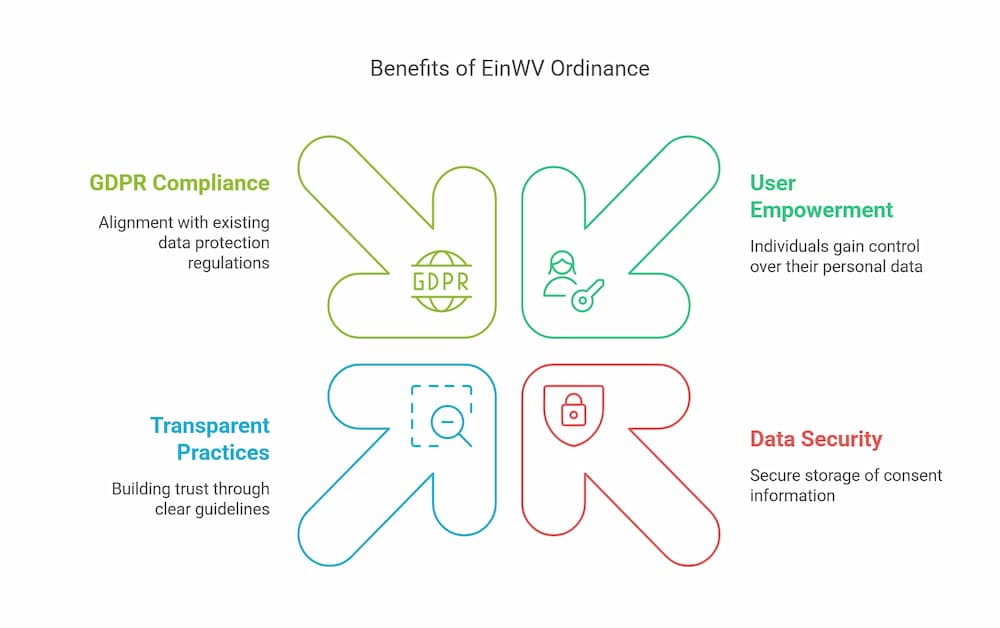Introduction
Germany is leading in data protection and user privacy regulations, particularly through the Einwilligungsverwaltungsverordnung (EinWV Ordinance), which is transforming cookie compliance. This ordinance offers a framework for businesses to manage user consent transparently and effectively, addressing issues like cookie banner fatigue. The article explores the ordinance’s objectives, regulatory requirements for consent management services, the approval process by the BfDI, and its implications for data privacy and user rights in Germany, helping companies understand compliance and best practices for managing user consent.
Understanding the EinWV Ordinance
The EinWV Ordinance is designed with the aim of simplifying the online experience for users while reducing the overabundance of cookie consent banners that have long been a source of frustration. One of the core objectives of the ordinance is to alleviate what has been termed “cookie fatigue” by enabling a more centralized and seamless method for managing consent. In practice, this means that website operators and digital service providers are encouraged to adopt systems that can manage user consent more efficiently, thereby enhancing overall data privacy and user rights.
A key innovation introduced by the EinWV Ordinance is the establishment of a centralized consent management system that exclusively utilizes approved consent management services. Under this system, only recognized consent management services are permitted to process and store users’ consent preferences. This requirement ensures that all consent management processes adhere to strict data protection and privacy standards as dictated by the ordinance. The regulation is firmly based on Section 26(2) of the Telecommunications Digital Services Data Protection Act, which provides the legal foundation for these enhanced data protection measures. By reducing the repetitive display of cookie banners, the ordinance not only streamlines user experience but also positions Germany at the forefront of GDPR-compliant practices that empower users with clear and controlled access to their personal data.
To further elucidate the importance of the EinWV Ordinance, consider the following benefits it brings to the digital ecosystem:
User-Friendly Experience: Reduces intrusive pop-ups and cookie banners, making navigation smoother.
Enhanced Data Protection: Ensures that consent management is handled by services that are fully compliant with strict privacy regulations.
Centralized Oversight: Facilitates the monitoring of consent management practices by central authorities, ensuring higher compliance levels.
This framework not only simplifies the process of managing consent but also reassures website visitors that their data is handled with the utmost care and respect for their privacy. As digital service providers face increasing scrutiny over data practices, the EinWV Ordinance represents a key step in balancing corporate data needs with individual rights and privacy.

Consent Management Requirements
The EinWV Ordinance requires consent management services to meet strict standards for processing consent information. These standards ensure services are effective and secure, promoting uniform data protection among digital providers and website operators.
A key requirement is obtaining approval from the Federal Commissioner for Data Protection and Freedom of Information (BfDI). This involves a thorough review of services to ensure they align with data protection principles and GDPR compliance. To apply, participants must submit a detailed electronic application demonstrating their capability to manage user consent effectively.
Once recognized, consent management services must maintain their certification, incurring annual costs of around €79,000 to uphold their approved status. This ongoing expense encourages services to continually invest in compliance and improvements, benefiting both users and website operators.
Key requirements for recognized consent management services include:
Approval by BfDI: Every service must undergo a thorough review process to earn official recognition.
Electronic Application Process: Providers must submit comprehensive details on how they manage user consent and data.
Ongoing Certification Costs: Annual fees ensure continuous compliance and quality assurance.
Data Storage Standards: Consent preferences must be stored securely and be readily accessible for review by users and regulators.
These requirements ensure that consent management services are robust, reliable, and fully equipped to handle the complexities of modern data protection regulations. For companies and digital service providers, this means that the tools they choose to implement will not only simplify user interactions but also significantly enhance data privacy and protection.
Implementing the EinWV Ordinance
Website operators and digital service providers may initially find the transition to the EinWV Ordinance overwhelming. However, the regulation allows them to continue using their current Consent Management Platforms (CMPs) while gradually moving to recognized consent management services. This ensures minimal disruptions while shifting to a more secure and user-friendly consent management model.
The implementation requires a thorough review of current cookie consent practices. Many digital service providers have invested in advanced CMPs to collect and manage consent information. Under the new ordinance, these platforms must effectively manage user consent according to BfDI standards, which means they must be updated, secure against data breaches, and integrated with systems offering users real-time control over their consent preferences.
Companies are encouraged to choose a recognized consent management service to reduce the redundancy of cookie banners and improve the overall user experience. The advantages of implementing such services include:
Streamlined Consent Process: Users can easily navigate their consent preferences, reducing confusion and enhancing transparency.
Integration with Existing CMPs: Companies can continue to use familiar platforms while ensuring that they meet the new regulatory requirements.
Enhanced User Experience: By reducing the frequency of intrusive cookie banners, websites become more user-friendly and accessible.
Future-Proof Solutions: Implementing a recognized service positions companies well for future regulatory changes and technological advancements.
Website operators must ensure their CMPs accurately process consent information signals. This requires reviewing how consent data is transmitted, stored, and updated in real time. Digital service providers need robust systems to reflect changes in consent preferences across all digital interfaces immediately. This integration is a regulatory requirement and essential for building user trust in data transparency and control.
Compliance with the EinWV Ordinance presents both an opportunity and a challenge. For many companies, transitioning to recognized consent management services can provide a competitive edge, enabling GDPR-compliant, secure, and user-friendly digital experiences. Additionally, these practices help businesses manage user consent, safeguard data, and navigate evolving digital regulations confidently.

Data Privacy and Protection
The EinWV Ordinance aims to empower users by enhancing control over their personal data. The regulation strengthens data protection, ensuring users can informally exercise their rights. With digital providers managing large data volumes, secure data storage and processing is crucial. Users should easily access, review, and modify their consent preferences.
User consent for data use must be informed and explicit, prohibiting companies from assuming consent through passive actions, such as pre-ticked boxes. Companies must provide clear information on data usage. Consent management services act as trusted guards of user data, ensuring preferences are securely stored and used only for approved purposes. This commitment improves both data protection and user rights regarding consent management.
The benefits of enhanced data privacy and protection under the EinWV Ordinance are multifold:
Empowerment of Users: Individuals have greater control over their personal data, with the ability to navigate and manage consent easily.
Robust Data Security: Consent management services ensure that consent information is stored securely, reducing the risk of data breaches.
Transparent Practices: Clear guidelines for obtaining consent build trust between companies and their visitors.
Compliance with GDPR: The ordinance is designed to align with existing GDPR principles, ensuring that digital practices are both legal and ethical.
The ordinance covers telemedia providers, including websites and apps, that store or access user data beyond necessary technical limits. This ensures that all digital entities adhere to high data protection standards and encourages companies to implement best practices that align with current and future data privacy requirements.
Moreover, it stresses the need for ongoing oversight. Approved consent management services must accurately handle consent information and offer users a clear, easy-to-use interface for consent management. This approach strengthens digital service providers’ commitment to data protection and fosters a safer, more transparent online environment for users.
Penalties and Enforcement
Unlike some other regulatory frameworks, the German Consent Management Regulation under the EinWV Ordinance does not impose direct penalties for non-compliance. Instead, it establishes a system of recognition that can be revoked if a consent management service fails to meet the specified criteria. This approach focuses on incentivizing companies to adhere to high standards of data protection and user rights rather than penalizing them through fines or sanctions.
The voluntary nature of certain aspects of the ordinance means that recognized consent management services operate under a system of trust and accountability. While the responsible authority—the BfDI—is not obliged to conduct regular inspections, the threat of losing recognition is a significant motivator for providers to maintain robust and up-to-date compliance practices. Should a service be found lacking or unclear in its practices, its recognition status may be revoked, thereby affecting its ability to process consent information signals and manage user consent for digital service providers and website operators.
Key aspects of the enforcement framework include:
Revocation of Recognition: Consent management services must continually meet the established criteria to retain their recognized status.
Voluntary Compliance: The system is built on voluntary adherence, promoting best practices through accountability rather than immediate punitive measures.
Lack of Regular Inspections: While regular inspections are not mandated, the threat of potential reviews encourages continuous adherence to high standards.
Focus on Best Practices: The emphasis is on evolving and refining practices rather than merely imposing sanctions, ensuring that data protection remains the foremost priority.
This enforcement mechanism reinforces the idea that compliance is an ongoing commitment. Companies and digital service providers must remain vigilant in managing consent and data privacy to retain their status as approved providers. For many businesses, this means establishing internal controls, regular training for staff, and periodic audits of their consent management processes to ensure that they continue to meet the high standards set forth by the ordinance.
The non-punitive nature of the regulation also opens up new voluntary fields of activities for consent management services. Providers are encouraged to innovate and develop additional features that can enhance user experience while ensuring full compliance with data protection standards. This flexible approach allows companies to focus on building better, more secure tools that not only simplify consent management but also contribute to a safer digital environment for all users.
Conclusion
The EinWV Ordinance marks a significant advancement in cookie compliance and digital data protection in Germany. It creates a framework that requires consent management services, enhancing user experience and rights by reducing cookie banner fatigue. This regulation poses both challenges and opportunities for businesses to modernize their data practices securely. By understanding the requirements, companies can effectively navigate the regulatory landscape and uphold data protection standards. The emphasis on user control and streamlined consent management fosters trust and compliance. Looking ahead, the principles of the EinWV Ordinance will influence data protection practices in Germany and beyond, with businesses that invest in GDPR-compliant services better placed for future changes. The shift towards recognized consent management services signifies a transformative change in addressing data protection and user rights, with the journey to compliance promising improved user experience and operational efficiency.



